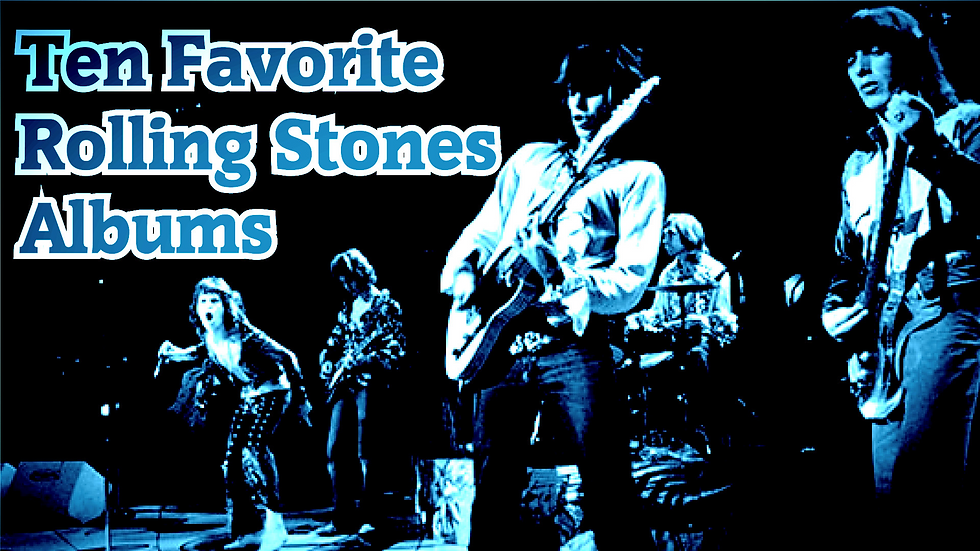
Anyone who knows me knows this is a big one, probably THE big one. I’ve been an obsessed fan and unashamed apologist for the Stones since I was a kid in my teens. They weren’t my first musical obsession, Elton John takes that honor, but they’re far and away my deepest dive. I have no doubt that Mick is the greatest rock vocalist ever, Keith Richards is the greatest guitar riff savant, and Charlie blows away any other drummer you’d care to name. I’ve seen them live twice, and both times was blown away by the incredibly loud roar of excitement from the crowd when they hit the stage, way different from other concerts. Only Paul McCartney was in the same ballpark.
My list is based on the albums they released in the U.S., which are a bit different than the albums from the U.K. A lot of early Beatles-like song shuffling and repackaging happened for the American market, and those are the records I grew up with. It was an ordeal to come up with just ten records from a catalog I love from first note to last, and another herculean task to put them in order of preference. On any given day….
There are a lot of favorite albums I had to leave out, which was painful. Even though a lot of fans count it among their worst, I love the sour, in-fighting vibe of Dirty Work, it suits them. Bootlegs could certainly have been included, I’m as smitten with Let Your Leeds Lungs Out (1971) and In Action (1967) as anything they released officially. I decided not to include their recent “vault” exhumations and “official bootlegs” because a lot of them aren't sold in stores, but San Jose 1999 and El Mocambo 1977 are must-hears. And where’s Let It Bleed, you might be wondering? A solid #11. Probably. Like I said, tough list.
(Note: Making this list, I only considered the original configurations of their albums, not the expanded box sets that have been coming out, with outtakes and live stuff added.)
• The Rolling Stones U.S. Discography – 25 studio albums, 12 live albums, 16 compilations
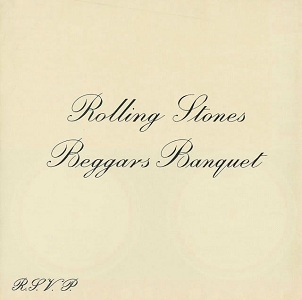
01 Beggars Banquet (1968) – This was the era of British bands making a name for themselves by playing loud, heavy, electric interpretations of American blues music. Cream, Zeppelin, Ten Years After, Humble Pie, Deep Purple, lots of others. The Stones took a different path by holding onto the gritty sexiness of American acoustic country blues. Beggars Banquet is presented on a smaller scale than albums from the groups mentioned above, but it’s in many ways more powerful because of that. This isn’t music that’s supposed to wow you with volume and bombast, although it punches hard at times, it invites you in to discover a brand-new kind of blues-based rock the Stones were inventing on the spot. Their influences are all still there - you can hear the blues, country music, Dylan, and Chuck Berry without trying too hard. But Mick and Keith had found a new spark and a vision for their own music, and the songs were flowing. “Sympathy for the Devil,” “Street Fighting Man,” “Dear Doctor,” “Salt of the Earth,” “Stray Cat Blues,” every song on Beggars Banquet is a stone Stones classic. The playing is creative and rocking, the arrangements deft and surprising. Keith, the band's only functioning guitarist at the time, was writing primarily on acoustic. I think Beggars is Mick’s greatest performance as a singer, and Charlie and Bill are Charlie and Bill, rock’s greatest rhythm section. This album marks the last appearance on record for Brian Jones, who was well on his way to becoming the next ‘60s drug casualty. As a parting gift, he played an acoustic slide guitar solo for the ages on the wonderful ballad “No Expectations.” The Stones' creativity exploded at this point, there are several mind-blowing albums coming in the following five years or so, but this one, most of the time, crosses the finish line first for me, by a nose.
EARWORM: "Stray Cat Blues" - A fine, bluesy, politically incorrect rocker that turned absolutely malicious onstage.
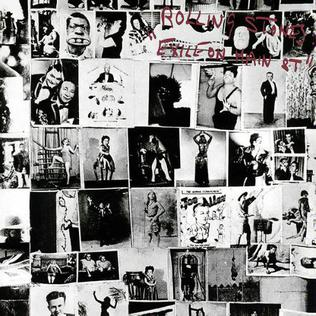
02 Exile on Main Street (1972) - My 15-year-old self, a portable cassette player, and a copy of Exile that I played constantly. I mean constantly – I walked around town with it, took it to school, never stopping until I had to attend a class or flip the tape over. I even brought it into a class once, my drafting teacher thought it would be okay to have a little light music playing while we drew, but stopped the tape as soon as he heard the opening guitar riff to “Rocks Off.”
That tape started an obsession with music that grew exponentially from that point; it was ground zero. I was already liking most everything I was hearing on the radio, the handful of 45s we had in the house, and a couple of Elton John tapes my mother had relented to buy, but Exile on Main Street was a different beast entirely. What is this stuff? 2LPs worth of gritty, explosive rock and roll, recorded in a damp, claustrophobic basement in the south of France. The environment led to less than audiophile sound, but that just made it all even more mysterious and compelling to me. There were great radio hits from Exile - “Tumbling Dice,” “Happy,” “All Down the Line,” but what pulled me in was how amazing every single song was. “Loving Cup,” “Shine a Light,” “Sweet Black Angel,” “Let It Loose,” “Sweet Virginia.” No matter how deeply I dove into Exile’s murky depths, I heard a kind of seductive alchemy that was new to me. As a band, the Stones were disheveled at this point. The guys were following their individual lives and interests, often at the expense of the group, but when they went down the stairs into the windowless basement of the former Gestapo headquarters Keith was renting, they were channeling rock and roll magic.
EARWORM: "All Down the Line" - So many great choices, I went with feral, primal rocking Stones.
https://open.spotify.com/track/5GHKbjIY0gTCqoY5aruDDc?si=02b8bd5b3b6f45c1

03 Black and Blue (1976) - After their amazing run of albums, from Beggars Banquet to Goat’s Head Soup, the band got an unexpected bit of slagging from the music press and fans for 1974’s It’s Only Rock ‘n Roll. The complaint was that it sounded a bit formulaic, lacking the explosive creativity of one of the greatest six-album runs in music history. They had invented an entirely new and exciting style of British blues rock between 1968 and 1974, but fans complained they sounded tired, like rich men going through the motions. To add injury to insult, after publicly squabbling with Mick and Keith about who wrote what songs on It’s Only Rock ‘n Roll, their not-so-secret weapon, blues guitar wunderkind Mick Taylor, left the band.
The Black and Blue sessions, then, became an audition to find a new second guitarist. A who's-who of hot-shit guitarists showed up in the Munich and Rotterdam studios – Steve Marriot, Peter Frampton, Jeff Beck, Rory Gallagher, there were even rumors that Eric Clapton was poking around for a while. In the end, three of the “tryouts” made the final record – Alabama-born southern rocker Wayne Perkins on three songs, Detroit native and former Canned Heat guitarist Harvey Mandel on a couple, and the eventual winner, Ronnie Wood on three. There wasn’t much suspense about landing the gig, the Stones had to interrupt the recording sessions for a tour of the U.S. and brought Ronnie with them, but the ramshackle album they finally got in the can when it was over is loose, rocking, and packed with great new songs. Everybody knows “Hot Stuff,” where the Stones showed they could make disco sound menacing. Two of Mick’s best ballads are here, “Fool to Cry” and “Memory Motel,” alongside two of their better mid-70s snarling rockers, “Hand of Fate” and “Crazy Mama.” A dash of reggae added for the hell of it, a little R&B courtesy of Billy Preston, and we have an album that may not reach the genius heights of their greatest, but I love its off-the-cuff sense of fun.
EARWORM: "Crazy Mama" - The album closer. Another seemingly effortless classic rock song.
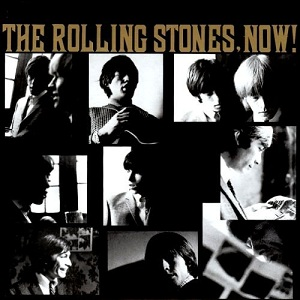
04 The Rolling Stones, Now! (1965) - Before Mick and Keith took over the songwriting for good on Aftermath, the Stones released a number of fine albums that were mostly cover songs with a few spectacular originals here and there, much like the early Beatles.
What makes this one break into this list over the others? Technically, it’s their second album. What was The Rolling Stones No. 2 in the U.K. became The Rolling Stones Now! In the U.S. after the record label shuffled some songs around. Only four of the songs are Jagger/Richards originals. They had a ways to go yet, but the four are terrific. “Heart of Stone,” “What a Shame,” “Surprise Surprise,” and the killer “Off the Hook” showed the lads learning fast. It’s the cover songs that keep me coming back, though, the best batch on an early Stones album. Bo Diddley, Chuck Berry, Willie Dixon, Allen Toussaint, Solomon Burke all get covered, but even they’re surpassed by a red-hot version of Don Raye’s “Down the Road Apiece,” one of my most favorite Stones songs.
EARWORM: "Down the Road Apiece" - What else? One of their greatest overlooked songs.
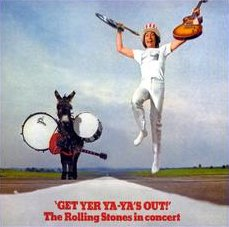
05 Get Yer Ya-Ya’s Out! (1970) - Exile on Main Street is undoubtedly my most listened to album, period. Even after my early obsession, I still listen to it fairly often. This one just might be #2. London Records released Get Yer Ya-Ya’s Out! hoping to slow down the bootleggers, who were making a killing on audience tapes of the Stones' 1969 tour. It's edited, overdubbed, the songs aren't in the same order as they were onstage, and I don't care even a little bit. It plays as one of the great live albums in rock history, maybe the greatest. I’ve heard it so many times I know every note and beat by heart. Their stage announcer in ’69 primed the crowd by introducing them as “The Greatest Rock and Roll Band in the World.” There were a handful of years there when nobody disagreed.
EARWORM: "Jumping Jack Flash" - "Is everybody ready? Everything seems to be ready."

06 Some Girls (1978) - This was the studio follow-up to the loose, rangy Black and Blue, but the music universe had changed dramatically in those couple of years and the two records sound nothing alike. The punks had taken over and were sucking the air out of music journalism for everybody else. Music writers were thrilled to have something new and seismic to write about, and a lot of the punks were better at playing the media than their instruments. A common target of the young musician’s wrath was the “dinosaurs,” the classic rock bands that were still together and doing pretty much the same thing they'd been doing since the 60s. They were now, the safety-pinned crowd said, completely irrelevant to rock music.
The Stones took the bait and made one of their most focused, funniest, and hardest, albums. Lots of Stones fanatics put it at #1 without much pushback from other fans. The explosive, razor-sharp rockers like “Respectable” and the S&M-themed “When the Whip Comes Down” demonstrated to the youngsters who the original punks were. Mick wrote the title song to disabuse anybody from thinking the Stones had become politically correct in their old age, and the big single, “Miss You,” was a radio-friendly slice of dance club music with serious attitude. “Far Away Eyes,” was their funniest and most sarcastic country song ever, and just for a little icing they threw in the gorgeous “Beast of Burden,” something completely out of the reach of their spike-haired critics. As a final kiss-off to the naysayers, Keith added the driving “Before They Make Me Run,” his best solo song since “Happy,” an unsubtle reminder that he was still living the life the punks were playing at.
EARWORM: "Shattered" - The band's winding, glorious ode to NYC.
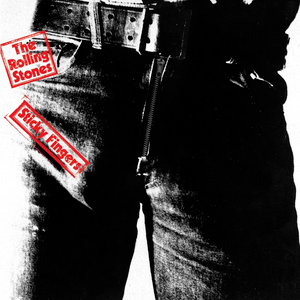
07 Sticky Fingers (1971) - The Stones were in a great place in 1971. Their previous two albums had been praised as instant rock classics, they were seeing massive album sales and press adulation, the cracks in their inter-personal relationships hadn’t really dug in yet, and Keith had yet to fall completely under the spell of heroin. They were a cocky band of brothers who believed they could do no wrong, and were proving it with every recording.
That’s what Sticky Fingers sounds like to me. It’s creative, it’s bold, it’s supremely musical, and the songs kick ass from start to finish. The album also sounds like the growing cynicism the band was feeling about the trappings of world-wide fame, so there’s a dark undercurrent, too. “Brown Sugar” was the smash hit and perennial concert favorite, “Wild Horses,” one of their loveliest country-adjacent songs, “Sway” one of their best heavy rockers. All the other songs are amazing, too, especially the last one. To end this loud, defiant, brilliant rock record with the beautiful and ghostly “Moonlight Mile” is one last stroke of genius on a record full of them.
EARWORM: "Can't You Hear Me Knocking" - The one where they left the tape running after the take was finished and caught an impromptu guitar jam for the ages.

08 Goats Head Soup (1974) - The accepted music journalism canon is that the Stones had one of, if not the, best runs of five consecutive albums in rock history, from Beggars Banquet in ’68 to Exile on Main Street in ’72. The critical consensus also says that starting with this album in 1974, they lost a step. I seriously, vehemently disagree. To me, and to most Stones diehards, Goats Head Soup deserves to be placed in the same pantheon as the others.
The recording of the album was a disjointed affair, with the bulk of the songs recorded at Dynamic Sounds in Kingston, with some final work done in Los Angeles and London. According to Keith, they chose Jamaica because it “was one of the few places that would let us all in!” With their tax exile status and his history of drug busts, Keith claimed he had been denied entry to, or kicked out of, nine other countries. Bill Wyman was a no-show for a lot of the sessions, he's only on three tracks. Keith and Mick Taylor played most of the album’s bass.
Despite the recording mayhem, the songs on Goats Head Soup are spectacular vintage Stones. A little ragged in spots maybe, but when has that ever stood in the way of a great Stones album? The record has a murky, druggy mood to it that turned some fans and critics off. Keith’s outstanding ballad, “Coming Down Again,” addresses his stealing Brian Jones’ girlfriend Anita Pallenberg, while “Dancing with Mr. D,” the opener, flirts with their carefully cultivated satanic image, “Sympathy for the Devil” 2.0, if you will. “Angie” was a monster global hit single, “Doo Doo Doo Doo Doo (Heartbreaker)” was right behind it, and “Star Star” (original title: “Starfucker”) their most effective and lascivious Chuck Berry rip-off. In a lot of ways, it's the deep cuts that are the most fascinating songs on the record. “Hide Your Love” and “Can You Hear the Music,” accused at the time as sounding like demos, are absorbing, essential throw-aways on the level of “Turd on the Run” and “Ventilator Blues” from Exile on Main Street. “Winter,” hidden deep on the second side, is easily one of Mick’s most affecting heartbreak ballads. Goats Head Soup was the last time the band would use MVP Jimmy Miller as their producer, he had manned the helm since Beggars Banquet. He ended his association with the band on the same high note he started it with, giving the Stones their sixth, not fifth, consecutive brilliantly creative, deeply satisfying album.
EARWORM: "Star Star" - Don't play it if the kids are within earshot.
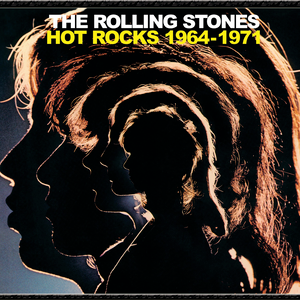
09 Hot Rocks (1971) - The greatest hits collection that cemented my obsession. The one to buy if you only need one Stones album in your collection. Yeah, it cuts off at Sticky Fingers, a lot of great music came after that one, but every one of the 21 tracks is essential rock and roll music that any fan of the genre needs to hear many, many times. Every fabulous single from the moment Mick and Keith decided they wanted to compete with John and Paul as songwriters. Personally, I need the albums that follow where this collection leaves off in my life, including some later compilations, but, to paraphrase an old beer commercial, it’s the one to have if you’re only having one. The stone tablets of 60s rock music.
EARWORM: "Ruby Tuesday" - You make your pick, I'll make mine. There's no wrong answer.
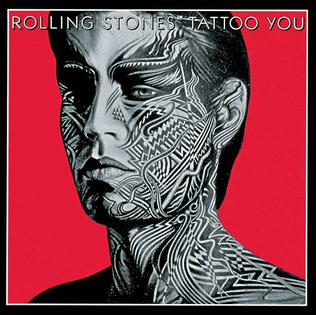
10 Tattoo You (1981) - By no stretch of the imagination should Tattoo You work as well as it does. The Stones had tour obligations facing them in '81, they weren’t getting along on a personal level, and Ronnie was a slave to the crack pipe. There was simply no way they could agree on a studio session to record new music. So their production team did the next best thing – they dug through abandoned recordings from sessions going back as far as 1972, picked out the most promising tracks, and had the individual band members come to the studio to work on cleaning and punching them up when their schedules allowed. Keith found an old reggae song he had worked on during the Some Girls sessions, labeled on the tapes as “Never Stop,” added a monster guitar riff, changed the tempo, and “Start Me Up” became a smash rock anthem. Mick liked one of the piano demos he had recorded for Goats Head Soup, added acoustic guitars and jazz legend Sonny Rollins on sax, and “Waiting on a Friend” was born. “Worried About You” was from the Black and Blue “guitarist audition” days, runner-up Wayne Perkins’ guitar work was left on the album. “Hang Fire” finally made it to a record on the third try, having been left off Some Girls and Emotional Rescue.
To make Tattoo You’s success even more unlikely, when the tracks were finished, they were arranged on the final album with the fast songs on side one, the slow songs on side two, an approach with a long history of failure for other bands. The resulting album shows, beyond a doubt, that the Stones have always been unlike other bands. Tattoo You was not only a critical and commercial success, it’s been recognized by their fans around the world as their last truly great album. Whether it is or isn’t is a discussion for another day, but it’s unquestionably up there among their best.
EARWORM: "Waiting on a Friend" - The lads at their radio-friendliest.
I can’t end this without acknowledging the elephant in the room – the state of the Rolling Stones in 2022. They toured Europe earlier this year, and have made noises about working on a new album when time allows. Without Charlie, I don’t see how they continue into the foreseeable future. They looked a bit tired and showed their ages onstage this year and, more importantly, without their brilliant drummer they don’t sound like the same band anymore. Nothing except the excellent 2020 single “Ghost Town” has emerged from their rumored recording sessions, and there’s been no word at all about them resuming since Charlie passed. As far as this dedicated, appreciative fan is concerned, they can go ahead and call it a day. They’ve given me everything I could have asked for as a fan - the most creative, exciting, challenging, and satisfying catalog of music in rock and roll history. I can happily listen to what they’ve already given us for the rest of my days.
BTW, having seen two Stones shows last year with Steve Jordan in the drummer's chair they were ferocious. "Experts" have long claimed Charlie played behind the beat which, as my jazz drummer son explained to me, is impossible. The drummer IS the beat and it was the rest of the band rushing things. Jordan whips them like the thoroughbreds they are and they rose to the occasion, keeping up with the drummer for a switch. Moreover, Keith has apparently found some treatment or miracle for his arthritic, swollen fingers (noticeably smaller) and in 2021-22 can be heard loud and proud (with the occasional fluffed chord) throughout the set. Prior to '21 (going back to 2012 or so) he'd seemingly be…
A Stones Top-Ten with "Goats Head'" in place of "Let It Bleed"? I wouldn't call it heresy. Brave maybe, :-)